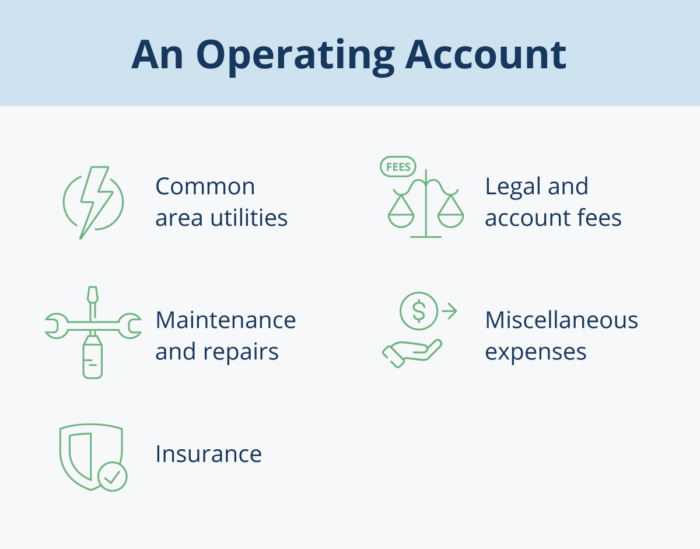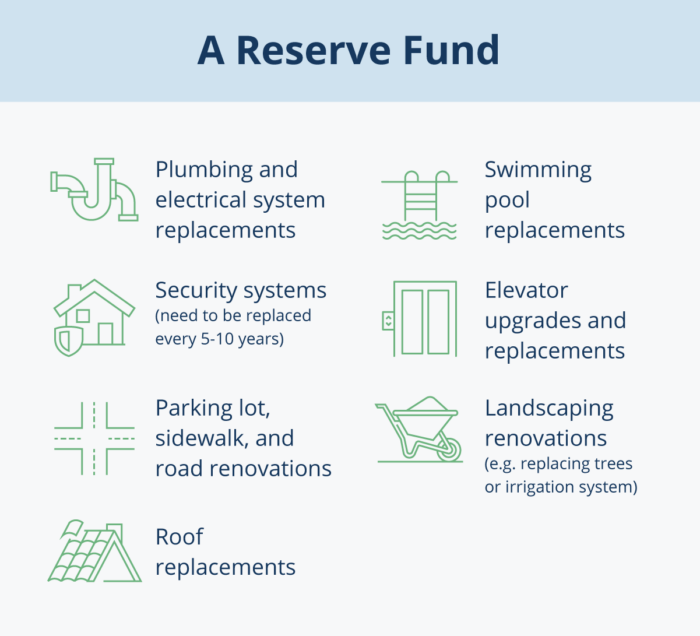Smart financial management is a big part of an HOA’s success. It reassures residents that the board you represent is using funds effectively, in a way that preserves and enhances their shared community—but achieving this is easier said than done.
HOA Reserve Fund Accounting
Reserve funds can be a lifeline for your association management business. Learn their ins and outs and how to set one up the right way.
Get the GuideRising costs, particularly skyrocketing insurance costs, are straining associations’ finances. And according to Buildium’s Community Association Management Industry Report, 30% of HOA board members say that budgeting for necessary expenditures and paying bills are a major source of stress—and 58% say it’s a primary reason why they decided to hire an association management company.
This guide dives into one of the key parts of managing an association’s budget: HOA banking. We’ll show you how to simplify banking for the associations you manage and reveal some tools you can turn to for help.
5 Banking Responsibilities for HOA Managers
An HOA manager’s primary responsibility is to keep the HOA running smoothly. Effective financial management is a critical part of achieving that goal.
There are five main banking-related tasks that an HOA manager should be responsible for. You might choose to offer additional services, but be sure that you have a process in place to manage these core responsibilities efficiently:
- Set up and manage operating accounts and reserve fund accounts
- Collect fees from homeowners and allocate funds to different accounts
- Manage the relationship between the HOA and the bank
- Set up processes for accurate financial management
- Report on the financial health of the HOA to the board
Setting Up HOA Banking Accounts: Operating vs Reserve Fund Accounts
There are two main types of banking accounts: operating and reserve funds. Knowing how they’re governed and the key differences between them can help your HOA respond to immediate needs while setting up for long-term success.
What Is an Operating Account?
More broadly known as a checking account, an operating account is the association’s main fund. It covers daily operations, services, and expenses, such as:

- Common area utilities: water, gas, electricity, and sewer management
- Maintenance and repairs of common areas including landscaping, playrooms, sundecks, swimming pools, and other shared spaces
- Insurance: property insurance, directors and officers insurance (D&O), garage keeper’s coverage,
- Legal fees and account fees: litigation, contract review and negotiation, compliance training, consultations
- Taxes: property taxes and taxes associated with common areas
- Miscellaneous expenses: office supplies, management fees, professional services
Operating accounts should not be used for:
- Personal expenses
- Gifts, bonuses, or loans to board members, employees, vendors, or homeowners
- High-risk or speculative investments
- Non-HOA related activities and unapproved projects
What Are Reserve Funds?
Reserve funds are savings set aside by the HOA to fund irregular, unpredictable, or large-scale repairs and expenses. This provides a safety net to cover substantial but inevitable projects without having to split costs among residents through special assessments or increase HOA dues.
Some examples:

- Plumbing and electrical system replacements
- Security systems (need to be replaced every 5-10 years)
- Parking lot, sidewalk, and road renovations
- Roof replacements
- Swimming pool replacements
- Elevator upgrades and replacements
- Landscaping renovations (e.g. replacing trees or irrigation system)
Reserve funds should not be used for:
- Routine, day-to-day expenses like minor repairs and regular landscaping
- Administrative costs
- Parties or community events
- Legal fees and taxes
- Utilities
- Insurance premiums
- Personal loans or cash advances for board members, homeowners, or any stakeholder
How Do You Set Up a Reserve Fund?
There are many factors that come into play like the number of properties, community amenities, total assets, age of your properties, and even natural disaster risks. The most important thing is to have a firm understanding of every major upcoming maintenance project. Here’s how to get started:
Step 1: Conduct a study.
Hire a reserve study firm or specialist to evaluate the life expectancy of every major asset. This will provide a funding plan and a timeline of how much money to set aside each year to fund them. All properties backed by an FHA, Freddie Mac, or Fannie Mae loan are required to conduct a study every two years.
Step 2: Create a reserve fund account.
Look to set up a reserve fund account with a bank or credit union completely separate from the operating funds to prevent commingling and ensure transparency. Ideally your reserve fund account should offer interest.
Step 3: Develop a budget.
Next, add up the estimated costs of all anticipated maintenance, repairs, and upgrades and divide them by the years of the study conducted. Factor in inflation and potential increases in costs if the study spans for a longer time period. And finally, include the annual reserve fund contribution as a line item in your annual budget.
Step 4: Keep stakeholders informed.
Present the reserve fund budget and the required contributions to the HOA board for approval. Communicate with homeowners about the reserve study, clearly outline upcoming projects that the reserved fund will cover, and specify the contributions necessary to fund them.
How Much Should You Have in a Reserve Fund?
There are lots of factors that will affect the dollar amount that each individual HOA will need in their reserve fund. While there are no benchmarks, a good benchmark is to have 70-100 percent of the funding targets outlined by the funding plan study. For a deeper dive into reserve funds, read our full guide here.
How Do You Find and Evaluate the Right Banks for Your HOA?
The bank or credit union you select for your HOA can impact integral aspects of your finances—like how you access your money and how much interest you can generate. Here are a few questions you should answer before making your final decision.
Do They Offer Competitive Fees and Interest Rates?
Most accounts have maintenance fees, transaction fees, and service fees for withdrawals, transfers, and check processing. Be sure to take this all into consideration when calculating the costs of operating your account. Different banks and credit unions also offer interest rates, so your money can grow just by sitting in the account. Be sure to take advantage of banks that offer introductory bonuses that may also help lock you into a higher interest rate.
Do They Provide Exceptional Customer Service?
Check if your bank or credit union has physical locations nearby for in-person meetings and offers online communication tools. Explore their website to see if they have adequate support beyond their operating hours through calls, chat, and email. A great bank will work with you to resolve any urgent issues, which is especially crucial if you need access to your reserve funds. Lastly, you can look at customer reviews from review sites and community forums to see if there are any potential red flags.
Do They Understand the HOA Business?
Banks and credit unions that tailor their business for HOA and property businesses can help guide you through the paperwork and regulatory requirements of opening a bank account. On top of this, some banks offer dual signature requirements for added security, detailed reporting and statements to help keep better track of finances, and vendor payment services to facilitate direct payments to vendors or service providers.
Do They Provide Appropriate Security?
You can never be too safe with your money. Ensuring the bank has the right security measures can minimize your risk of losing your funds for any reason.
A good place to start is by making sure the bank or credit union is insured. An FDIC insured bank insures money up to $250,000 in the case the bank fails. Credit unions are insured by the National Credit Union Administration (NCUA).
Banks should also provide adequate security measures on the consumer side. Double signature requirements for large transactions can be a good start. They should also offer multilayer authentication (two-factor authentication), and account alerts in case of any suspicious activity.
How to Integrate HOA Banking with the Rest of Your Accounting
Software can centralize all your important financial management tasks into one platform. From accounting to fee collection and reconciliation, Buildium’s association management software includes features that makes managing HOA funds easy.
A purpose-built management software such as Buildium lets you integrate HOA banking into your existing system by automatically tracking income and expenses, categorizing every transaction, and reconciling bank statements.
While generic accounting software can do the job, software with HOA-specific capabilities can make financial reporting a lot easier. For example, Buildium’s real-time reports and reconciliation feature provides HOA boards with a clear picture of the association’s financial health—and shows the metrics that actually matter to the business.
How to Set Up Automatic Bank Reconciliation
Finding discrepancies between your account balance and the bank balance can negatively affect your taxes and financial reporting. HOA management software like Buildium, with accounting features built for property business, can detect typos, duplicates, missing entries, and bank errors. It automatically reconciles your financial records, saving you time and reducing clerical errors.
How to Simplify Management for Accounts Payable and Receivable
Streamlining the management of money flowing in and out of your accounts boosts efficiency and keeps your books accurate.
Axela® takes the manual work of accounts receivable by automating dues collection, tackling delinquencies, and keeping the cash flowing. It allows you to outsource all collections and avoid potential FDCPA claims by handing over the liability of collections to a third-party.
Similarly, CondoWorks® handles accounts payable by automating invoicing, vendor management, and approval workflows to reduce clerical errors and save you time.
Who Should You Communicate with about HOA Banking?
Having a plan to improve your banking systems is not enough. A large part of an HOA manager’s success is getting buy-in from stakeholders and keeping them informed. Here’s who that includes:
- President: should be informed about major financial decisions. Typically responsible for final sign-off on budget approvals and major transactions.
- Treasurer / Finance Committee: reviews budgets, handles accounts, reviews financial statements, and taxes. HOA managers should be communicating with Treasurers and the Finance Committee as much as possible.
- Board Secretary: manages and organizes important records, documents, and meeting minutes.
- Board Members: participate in meetings and collectively vote on decisions.
- Homeowners: attend meetings, pay fees and dues, have input in town halls.
While in-person meetings remain important, a communication portal can help you engage board members and the HOA community through direct messages, bulletins, automated updates and announcements sent via text, email, or mail in one platform. A communication hub keeps all your records in one place and lets homeowners get in touch with you directly.
Simplify HOA Banking with the Right Tools
Effectively managing an HOA’s bank accounts is an important step to managing and a healthy community association with accuracy and transparency. To simplify HOA banking, start with the right tools. Buildium’s association management software can help by integrating all your financial and HOA management activities into one simple-to-use platform. You can see if Buildium is the right fit for your business with a free 14-day trial (no credit card required).
Read more on Accounting & Reporting

